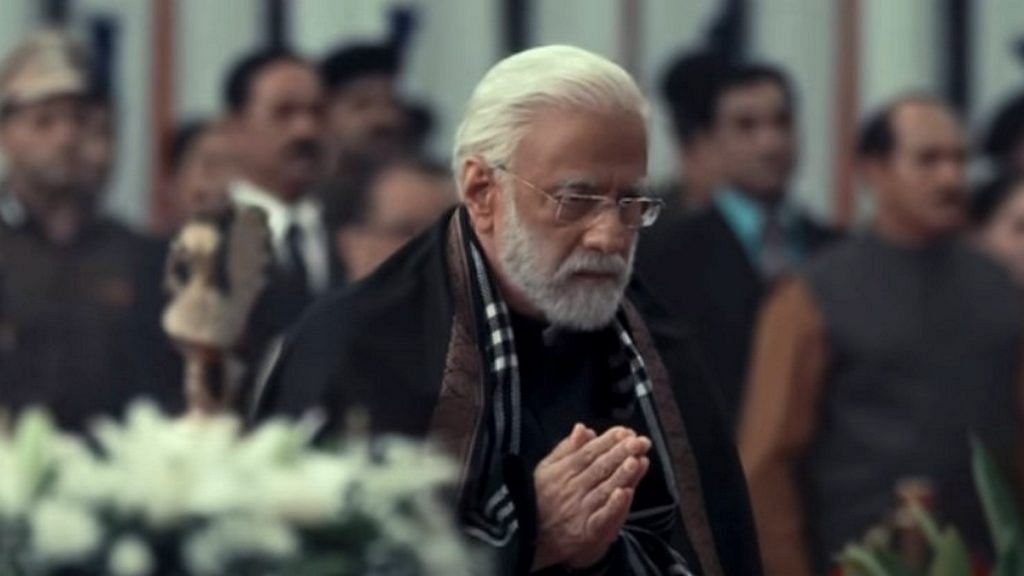New Delhi: In Article 370, Abdali, a double agent posing as a dry fruit merchant, cooks up a scheme. He pays stone-pelters to ambush the convoy that is taking him to interrogation. To deal with the fast-escalating situation, CRPF commander Yash Chauhan ties Abdali to a jeep, and manages to escape unscathed.
This scene has glimmers of a real-life controversy. In April 2017, during the Srinagar bypolls, Major Leetul Gogoi of the Indian Army tied a local artisan called Farooq Dar to his jeep, using him as a human shield against stone-pelters. Gogoi was later suspended for six months, but in the movie, the treatment meted out to Abdali is presented as justified since he is an ISI agent. It’s even lauded by the head of the Shopian village where the incident takes place in the film. This is just one example of how “inspired by true events” movies sometimes blur lines between fiction and reality, potentially misleading audiences who may accept the narrative as ‘truth’ rather than a creative interpretation.
Directed by Aditya Jambhale and written by Aditya Dhar of Uri: The Surgical Strike (2019) fame, Article 370 joins an ever-increasing line of films that claim to be “inspired” by real events, including The Kerala Story (2023) and The Kashmir Files (2022). It is also the most well-made of the lot, which makes it the most likely to be seen as an accurate portrayal of events by its viewers.
“Article 370 chronologically tells the truth, what had happened, and how it happened. There is no jingoism. There is nothing in the film which will feel distasteful. It is a pure story of how these people pulled off such a massive operation. It is a great story,” said Dhar in an interview, while promoting the film. Dhar is right—it is a story after, all. But it also seems to serve the purpose of bolstering the BJP’s image before the upcoming Lok Sabha polls, exactly like his 2019 pre-election film, Uri. Once again, Dhar’s timing is impeccable, as is his skill of presenting a mix of fact and fiction as truth.
Also Read: The Devil Wears Prada is going to Broadway. But it makes no sense without Meryl Streep
Propaganda lite, with entertainment value
Where The Kashmir Files fell flat by relentlessly pushing propaganda, Article 370 scores by striving for entertainment alongside its message. The film effectively deploys tense moments to keep the audience entertained— like the gunfire exchange leading to the death of Burhan Wani, which is shown in parallel to the verbal exchanges in the Rajya Sabha during the bill’s introduction.
And unlike The Kerala Story, which resorted to gross exaggerations and harmful generalisations of Muslims as sympathisers of ISIS, Article 370 employs a lighter touch. But though it even manages to have one Muslim CRPF officer as the token good guy, and a village chief as the ‘helpless’ one who feels empowered by the Modi government, the other Muslim characters, ultimately, are villains or brainwashed.
The film revolves around two women—NIA officer Zooni Haskar (Yami Gautam Dhar), who has her own painful backstory of being a victim of the misuse of Article 370, and top-level PMO civil servant Rajeshwari Swaminathan (Priyamani), who sets the wheels in motion for the process of abrogating Article 370. This is most definitely not a film about women’s emancipation, as Dhar has dubbed it, but the two characters are nevertheless well fleshed out.
Dhar delivers a strong performance, portraying Zooni’s resilience amidprofessional quandaries and emotional turmoil, be it losing a friend and colleague in the Pulwama attack, or reminiscing about the tragic death of her whistleblower father. From her body language to facial expressions, she is also convincing as a field agent gunning down terrorists. Priyamani’s Rajeshwari has fewer lines, but dressed in starched, neatly pleated handloom sarees, and with a calm yet steely demeanour, she embodies quiet strength as she navigates the power corridors in Delhi.

Arun Govil as Prime Minister Narendra Modi is probably the closest any cinematic portrayal has got to mirroring his appearance, body language, and dialogue delivery, and the same goes for Kiran Karmakar’s depiction of Home Minister Amit Shah. Credit is due to the film’s makeup department for getting the look just right.
The background score is near-perfect, complementing the narrative without overpowering the action.
The dialogues are dramatic but largely avoid crossing over into absurdity. However, certain lines, such as the home minister calling opposition leaders “part-time politicians”, provide a clear glimpse into the film’s political bent and the party it promotes.
Also Read: Big K-pop stars aren’t coming to India and it’s because fans aren’t rich enough
Good vs evil
There are no nuances to Dhar’s morality play when it comes to presenting which side is ‘good’ and which is ‘evil’. The ‘good’ side is made up of hardworking, self-effacing, dedicated soldiers and intelligence agents, bureaucrats, and an almost-sage like prime minister. The ‘evil’ side consists of corrupt, caricatured Kashmiri politicians, brainwashed militants, and “paid” stone-pelters, getting their guidance from Islamabad and lacking any capacity for independent thought. The film makes it easy for the audience to pick its side, aided by dialogues, flashbacks, and blown-up newspaper clippings.
“Every film can be open to interpretation, but we are talking about facts. Our film is based on true events,” said Yami Gautam Dhar in an interview. Despite the constant emphasis on this, the film’s biases are glaringly obvious.
Everyone and anyone in opposition to Article 370, the central government, or the armed forces is turned into a caricature in the film. Characters obviously modelled after former Jammu & Kashmir chief minister Farooq Abdullah and PDP president Mehbooba Mufti are shown as mere promoters of separatism and militancy in the state. An anti-Nehru stance is set up right in the beginning of the movie, foreshadowing the Congress bashing at the end.
The film employs gross oversimplifications, from a covert operation to steal an original constitutional document from the J&K Secretariat library to portraying all youngsters as brainwashed by extremists. What is emphasised over and over again is that J&K’s homegrown politicians only care about money and power—such as when Zooni tells Rajeshwari that nothing can change in Kashmir, or when Jalal, modelled after Abdullah, and Andrabi, inspired by Mufti, meet to form a government.
The film’s underlying argument is that the state needed a saviour, and PM Modi and his decisions fulfilled that role. Period. The home minister declares that “not even a mosquito will be harmed” in Kashmir, which of course, is hardly true going by news reports.
Critical issues like human rights violations, mass arrests, internet shutdowns, and the complete security clampdown after the abrogation of Article 370 are not even hinted at. A binder given to a civil servant shows everything is peaceful and everyone is content. That is the happy ending.
(Edited by Asavari Singh)




Nice article. Especially, the use of simple colloquial language, unlike most review or opinion articles about films.